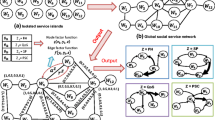Abstract
With the increasing popularity of social network services, a tremendous amount of information has been produced. And with more and more users involving in the SNS environment, their network relationships have become as complex as in the real world. In order to find out the useful information more efficiently, in this study, we propose a participatory search and recommendation system based on users’ social roles and their relationships in the SNS environment. The proposed system is used to filter users and their messages in a participatory way by analyzing their social roles and connection networks between each user, which can further contribute to personalized information search and recommendation. We describe the design and implementation issues of a prototype system, and discuss how to use the social roles and connection networks to support and empower information search and recommendation.







Similar content being viewed by others
References
Borgatti SP, Cross R (2003) A relational view of information seeking and learning in social networks. Manag Sci 49(4):432–445
Chen J, Shtykh RY, Jin Q (2009) Gradual adaption model for information recommendation based on user access behavior. Int J Adv Intell Syst 2(1):192–202
Elmisery AM, Botvich D (2011) Enhanced middleware for collaborative privacy in IPTV recommender services. J Converg 2(2):33–42
Fukazawa Y, Naganuma T, Fujii K, Kurakae S (2006) “User’s role oriented mobile service navigation system”. In: Proceedings of the 14th International Semantic Web Conference
Gallego D, Huecas G (2012) An empirical case of a context-aware mobile recommender system in a banking environment. J Converg 3(4):41–48
Jeong WH, Kim SJ, Park DS, Kwak J (2013) Performance improvement of a movie recommendation system based on personal propensity and secure collaborative filtering. J Inf Process Syst 9(1):157–172
Kaplan AM, Haenlein M (2010) Users of the world, unite! The challenges and opportunities of social media identification of common molecular subsequences. Bus Horiz 53(1):59–68
Liu D (2008) “Human flesh search engine: is it a next generation search engine”. In: Proceedings of the 3rd Communication Policy Research, South Conference
Mcleod S. Social roles, http://www.simplypsychology.org/social-roles.html (accessed on Nov. 23, 2013)
Nolker DK, Zhou L (2005) “Social computing and weighting to identify member roles in online communities”. In: Proceedings of the 2005 IEEE/WIC/ACM International Conference on Web, Intelligence, pp 87–93
Nomura K. Sociological sense, http://www.socius.jp/lec/09.html (accessed on Nov. 23, 2013)
Pan R, Xu GD, Fu B, Dolog P, Wang ZH, Leginus M (2012) Improving recommendations by the clustering of tag neighbours. J Converg 3(4):13–20
Roda C (2004) “Participatory system design as a tool for learning”. In: Proceedings of the 2004 IADIS International Conference on, Cognition, pp 366–372
Shtykh RY, Jin Q (2011) A human-centric integrated approach to web information search and sharing. Hum-Centric Comput Inf Sci 1(1):2
Trabado VJ, Sal DD (2012) “Building a role search engine for social media”. In: Proceedings of the 21st International Conference Companion on, World Wide Web, pp 1051–1060
Walter FE, Battiston S, Schweitzer F (2009) A model of a trust-based recommendation system on a social network. Auton Agent Multi-Agent Syst 16(1):57–74
Watts DJ, Dodds PS, Newman MEJ (2002) Identity and search in social networks. Science 49:1302–1305
Zhou XK, Chen H, Jin Q (2011) “Generating associative ripples of relevant information from a variety of data streams by throwing a heuristic stone”. In: Proceeding of the 5th International Conference on Ubiquitous Information Management and, Communication, pp 21–23
Zhou XK, Jin Q (2011) “Dynamical user networking and profiling based on activity streams for enhanced social learning”. In: Proceedings of the Lecture Notes in Computer Science, vol. 7048, pp 219–225
Acknowledgments
The work has been partly supported by 2012 and 2013 Waseda University Grants for Special Research Project under No. 2012B-215 and No. 2013B-207. The work of the third author has been partly supported by National Natural Science Foundation of China under No. 71061005/G0112.
Author information
Authors and Affiliations
Corresponding author
Rights and permissions
About this article
Cite this article
Wu, B., Zhou, X. & Jin, Q. Participatory information search and recommendation based on social roles and networks. Multimed Tools Appl 74, 5173–5188 (2015). https://doi.org/10.1007/s11042-013-1849-2
Published:
Issue Date:
DOI: https://doi.org/10.1007/s11042-013-1849-2




